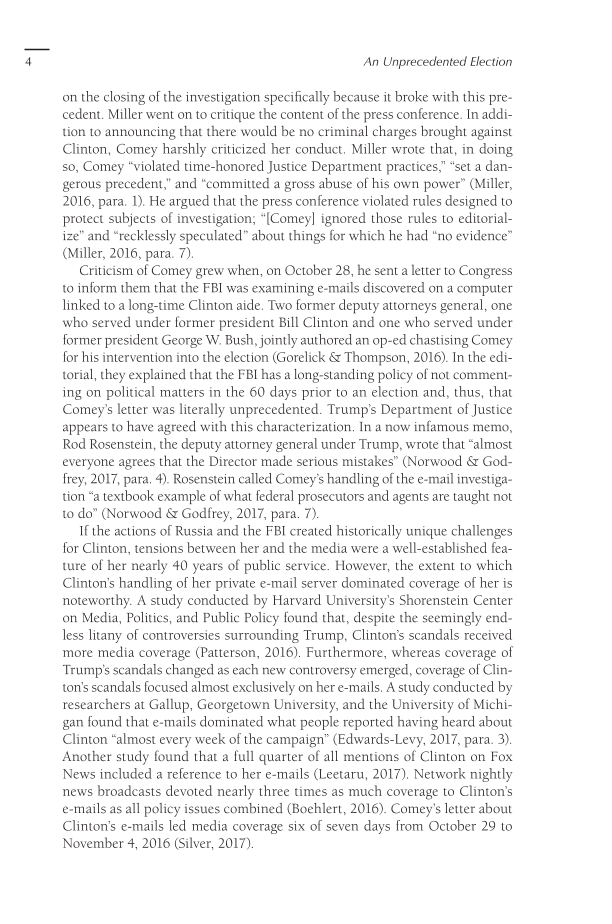4 An Unprecedented Election on the closing of the investigation specifically because it broke with this pre cedent. Miller went on to critique the content of the press conference. In addi- tion to announcing that there would be no criminal charges brought against Clinton, Comey harshly criticized her conduct. Miller wrote that, in doing so, Comey “violated time-honored Justice Department practices,” “set a dan- gerous precedent,” and “committed a gross abuse of his own power” (Miller, 2016, para. 1). He argued that the press conference violated rules designed to protect subjects of investigation “[Comey] ignored those rules to editorial- ize” and “recklessly speculated” about things for which he had “no evidence” (Miller, 2016, para. 7). Criticism of Comey grew when, on October 28, he sent a letter to Congress to inform them that the FBI was examining e-mails discovered on a computer linked to a long-time Clinton aide. Two former deputy attorneys general, one who served under former president Bill Clinton and one who served under former president George W. Bush, jointly authored an op-ed chastising Comey for his intervention into the election (Gorelick & Thompson, 2016). In the edi- torial, they explained that the FBI has a long-standing policy of not comment- ing on political matters in the 60 days prior to an election and, thus, that Comey’s letter was literally unprecedented. Trump’s Department of Justice appears to have agreed with this characterization. In a now infamous memo, Rod Rosenstein, the deputy attorney general under Trump, wrote that “almost everyone agrees that the Director made serious mistakes” (Norwood & God- frey, 2017, para. 4). Rosenstein called Comey’s handling of the e-mail investiga- tion “a textbook example of what federal prosecutors and agents are taught not to do” (Norwood & Godfrey, 2017, para. 7). If the actions of Russia and the FBI created historically unique challenges for Clinton, tensions between her and the media were a well-established fea- ture of her nearly 40 years of public service. However, the extent to which Clinton’s handling of her private e-mail server dominated coverage of her is noteworthy. A study conducted by Harvard University’s Shorenstein Center on Media, Politics, and Public Policy found that, despite the seemingly end- less litany of controversies surrounding Trump, Clinton’s scandals received more media coverage (Patterson, 2016). Furthermore, whereas coverage of Trump’s scandals changed as each new controversy emerged, coverage of Clin- ton’s scandals focused almost exclusively on her e-mails. A study conducted by researchers at Gallup, Georgetown University, and the University of Michi- gan found that e-mails dominated what people reported having heard about Clinton “almost every week of the campaign” (Edwards-Levy, 2017, para. 3). Another study found that a full quarter of all mentions of Clinton on Fox News included a reference to her e-mails (Leetaru, 2017). Network nightly news broadcasts devoted nearly three times as much coverage to Clinton’s e-mails as all policy issues combined (Boehlert, 2016). Comey’s letter about Clinton’s e-mails led media coverage six of seven days from October 29 to November 4, 2016 (Silver, 2017).
Document Details My Account Print multiple pages
Print
You have printed 0 times in the last 24 hours.
Your print count will reset on at .
You may print 0 more time(s) before then.
You may print a maximum of 0 pages at a time.









































































































































































































































































































































































































































































